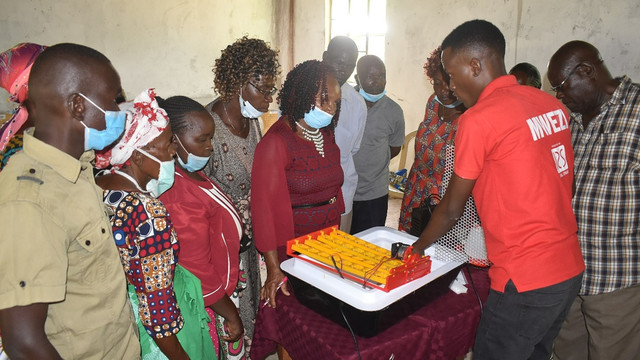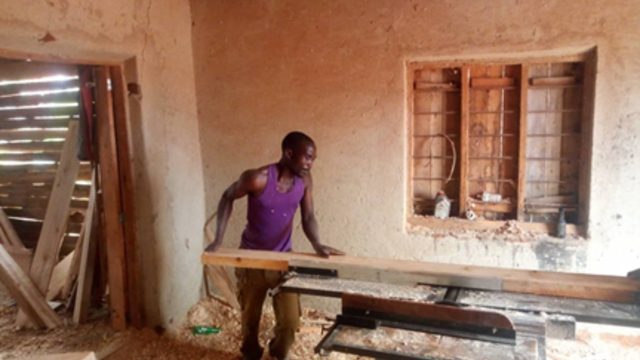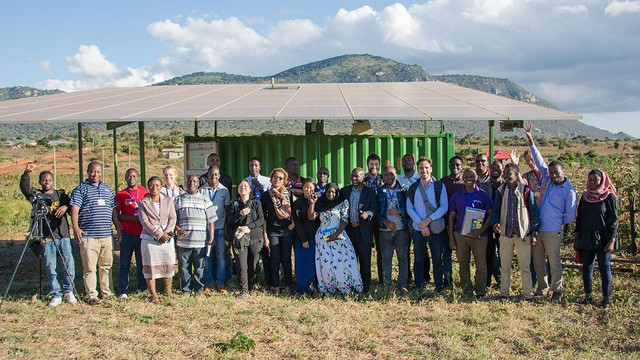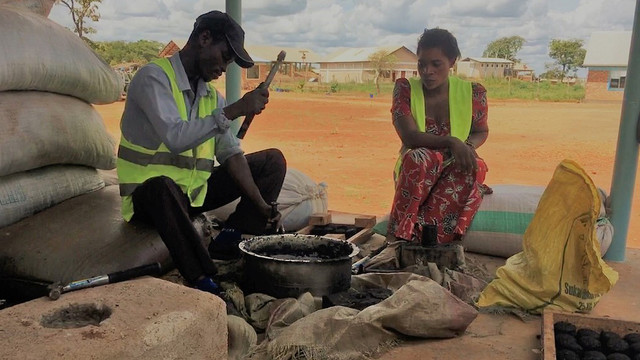Inclusive finance for universal energy access
The financing gap for universal energy access (Sustainable Development Goal 7) is persistent and enormous. IIED is exploring how finance instruments and models can be better calibrated to achieve energy for all.

Workers for Gham Power, a social enterprise that supplies renewable energy systems, install a 20kW solar PV system in the village of Chyasmitar in eastern Nepal (Photo: copyright Gham Power)
The technologies to achieve universal energy access are field tested and available. But the delivery models are still being refined and investment flows remain immensely insufficient to achieve universal energy access.
Off-grid systems, such as mini-grids, play a vital role, complementary to grid expansion, and are often deployed more efficiently and at lower comparable cost. But the grid continues to attract most energy financing, with crucial off-grid systems only receiving a tiny share.
To reach the 2030 Sustainable Development Goal 7 target, the scale and pace of funding for electricity and clean cooking must accelerate rapidly. And finance mechanisms should be fine-tuned, so they are tailored for off-grid projects and meet communities’ needs.
What is IIED doing?
IIED has investigated many aspects of the energy finance challenge and in 2014 looked at the relative roles of public and private finance in expanding energy access. Some of the private sector innovations we reviewed have persisted and thrived, such as pay-as-you-go business models that make technology more affordable to customers; while public finance innovations, such as Infrastructure Development Company Limited (IDCOL) in Bangladesh, have had to adapt to rapidly changing market conditions.
Mind the gap: scrutinising financial flows to off-grid energy
As funding and political commitments for energy access increased in the mid-2010s, IIED’s research shifted into detailed number-crunching. Our analysis of international, public climate finance for the first time put concrete numbers on the large flows going to the energy sector generally, and showed only a tiny proportion was dedicated to off-grid electricity or clean cooking.
Most climate funds were swallowed up by utility-scale projects in high and middle-income countries, and this was in part due to the design of the finance instruments. Multilateral funding agencies favoured credit-based instruments in projects with lower transaction costs and high greenhouse gas reduction potential – approaches that are less suitable for the smaller-scale projects and early stage of market development typical of the off-grid sector.
Keen to understand how this played out at a national level, IIED worked with local researchers in Tanzania to unpick energy funding there over the last decade. Again, just a small share of government and development partner funding for the energy sector was earmarked for decentralised energy.
In 2019 multi-country research by Sustainable Energy for All confirmed this funding bias, finding that just 1.2% of total electricity finance (2013-17) was targeted at off-grid projects. Meanwhile, annual financing of clean cooking actually fell recently to US$32 million – a worrying shortfall when compared with the US$4.4 billion needed each year to achieve clean cooking for all by 2030.
Obstacles to investment in energy access
The factors that inhibit investment in decentralised and renewable energy are wide-ranging and well-known. They include: gaps in policy regimes and political will for decentralised energy, both with lack of public investment and in some cases limits on foreign direct investment in to the sector; supply and demand of finance is not matched, inhibited by high costs of borrowing, exchange rate fluctuations, a shortage of proven business models and banking knowledge of the sector; and resulting punitive demands for high-levels of collateral to back loans.
Patient capital in the sector is lacking and expectations of quick returns are beginning to show signs of unsustainable growth – one of a number of reasons leading to the collapse of European company Mobisol in 2019. This issue was discussed in the second episode of IIED's Make Change Happen podcast in November 2019.
There is also the significant challenge of getting finance to large numbers of smaller-scale projects. This is not unique to energy, IIED’s wider work on local finance found common hurdles across energy, climate, forestry and urban services. One promising solution which emerged in this cross-sector work was the role of aggregation.
Potential for aggregators to remove investment barriers
Finance aggregators – entities that reduce costs and risks by bundling projects and capital together – have the potential to increase public and private investment into the off-grid sector. In 'Moving more money' we explored how IDCOL in Bangladesh and Alternative Energy Promotion Centre (AEPC) in Nepal, both government initiatives, have enabled energy access for some of the poorest in their respective countries by aggregating demand and offering mixes of finance (such as loans and subsidies) in the smaller sizes that growing markets need.
We also looked at a commercial aggregator, SunFunder, which mostly operates in Africa, and has shown potential for blended finance instruments – which pool funds from private investors, development finance institutions and impact investors – in attracting more investments into smaller, off-grid companies and projects.
In the 'Accelerating energy access with aggregation' briefing, we highlighted the promise of combining financial aggregation with the policy, market and business components needed to support sustainable energy enterprises in a coordinated way. For instance, by setting product standards, performing quality assurance, providing consumer finance and raising customer awareness.
Another promising aspect of aggregators is their potential to gather data on impacts. Zambia’s Beyond the Grid Fund for Zambia (BGFZ) requires companies to share usage statistics in order to qualify for funds; it then aggregates and publishes the data. This helps generate information on sector consumption and understand who is being reached.
Toward inclusive finance and delivery models
The question of impact leads to IIED's current focus on inclusive financing – instruments that enable energy access for people not reached through established delivery models, perhaps related to their poverty, gender or other vulnerabilities.
Interventions need to not only remove barriers, but ensure that existing power inequalities are not reinforced when energy services are deployed. Our work on cooking among women in refugee camps pinpoints some of the risks to think through.
We are particularly interested in the role of smartly-deployed subsidies, results-based financing, and in-depth impact metrics in helping energy enterprises expand their reach. IIED is working to identify agile metrics that could feed into standardised sector indicators already in use.
The starting point in our research that energy access requires clever deployment of public and private finance remains true. Despite impressive market advances, there is a continued need for more and better-targeted public funding – for smart subsidies to leverage philanthropic and private capital, and to support technical reforms that create a thriving enabling environment for energy providers.
IIED will continue to take our findings to policymakers, investors and enterprises to help catalyse investment into off-grid solutions and accelerate energy access for all.
Resources
Bridging the gap: how inclusive finance boosts access to off-grid energy, Nipunika Perera, Ben Garside (2019), IIED Briefing
IIED Insights: Accelerating energy access with aggregation, by Kevin Johnstone and Ben Garside (2019)
Event: How can inclusive finance accelerate universal energy access? (2019)
Moving more money: can aggregation catalyse off-grid financing?, Ben Garside, Kevin Johnstone, Nipunika Perera (2019), IIED Issue paper
Turning up the volume: financial aggregation for off-grid energy, Clare Shakya, Rebecca Byrnes (2017), IIED Issue paper
Money where it matters: financing the Sustainable Development Goals and Paris Agreement through local finance, Sian Lewis, Clare Shakya, Paul Steele (2017), IIED Event report
Money where it matters: an emerging agenda for local finance, Paul Steele and Clare Shakya (2017), IIED Reflect & Act
Money is power: tracking finance flows for decentralised energy access in Tanzania, Erneus Kaijage, Shukuru Nyagawa, Sarah Best, Remigi Cosmas, Suzan Temba, Benjamin Mtwanga, Novetha Mahanga (2017), IIED Working paper
Blog: Bringing solar out of the shadows, by Sarah Best (2017)
Unlocking climate finance for decentralised energy access, Neha Rai, Sarah Best, Marek Soanes (2016), IIED Working paper
Blog: The Green Climate Fund: will the vulnerable be overlooked in a rush to spend?, by Neha Rai and Sarah Best (2016)
Financing inclusive low-carbon resilient development in the least developed countries, Dave Steinbach, Nanki Kaur, Neha Rai (2015), IIED Working paper
Sharing the load: Public and private sector roles in financing pro-poor energy access, Emma Wilson, Neha Rai, Sarah Best (2014), IIED Discussion paper
Contact
Ben Garside (ben.garside@iied.org), principal researcher, IIED’s Shaping Sustainable Markets research group.
Kevin Johnstone (kevin.johnstone@iied.org), researcher, IIED's Shaping Sustainable Markets research group.



